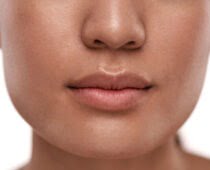
Last Updated on 28th June 2022
Lip cancer is a type of mouth cancer, which sounds scary, but the good news is that if caught early, it can be treated successfully. Early diagnosis of mouth cancer is essential and research suggests that if caught quickly the chances of survival are 90%, explain the dentists at Evesham Dental Health Team.
The signs and symptoms of lip cancer include:
- Visible changes in the skin on the lips.
- Open sores.
- A red patch that becomes crusty, itchy, or bleeds.
- Lumps or wart-like growths.
- A pale or white skin area that looks like a scar.
Some people panic when they see open sores on their lips, but although cancerous lesions may look or feel like cold sores when they first appear, they don’t heal as quickly. The most important thing to remember is if you do notice a change in your lips’ appearance, talk to your dental professional or doctor – we will be able to reassure you and refer you for a second opinion if necessary.
If in doubt get checked out!
At Evesham Dental Health Team we screen every patient for mouth cancer at every dental health review. As well as a conventional mouth cancer screening examination, featuring palpation of the face and neck and inspection under direct vision, and assessment of risk factors, we also use a VELscope Vx.
Studies have shown that the VELscope can detect cases of cancerous and pre-cancerous lesions that might be invisible to the naked eye. For most patients we detect nothing of concern, and our patients are pleased to receive the good news and peace of mind.
And don’t forget that we offer a FREE mouth cancer screening appointment to all members of our community, all year round. Just contact us for details.
Consider your exposure to the sun
Like many cancers, lip cancer can be attributed in part to lifestyle factors, and sun exposure, tobacco use and drinking alcohol increase the risk.
People who drink three to four alcoholic drinks a day are twice as likely to develop mouth cancer than those who don’t and the risk is two to three times greater when tobacco use and daily alcohol consumption are combined.
There are many lifestyle choices we can make to reduce our risk of developing lip cancer, such on cutting down alcohol and tobacco consumption, and as UV rays primarily come from sunlight, applying protective SPF lip balm daily, even on a dull day, is recommended.
For those who may find changing their habits difficult, please maintain regular dental health visits to ensure we can closely monitor your mouth.
To find out more, visit the Oral Health Foundation’s website at www.dentalhealth.org/spotthesigns.










